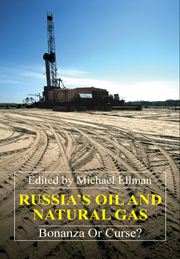Book contents
- Frontmatter
- Contents
- List of Tables and Figures
- Preface
- A Overview
- B Financial Flows
- 3 Price Differences, Taxes and the Stabilization Fund
- 4 Russia's Economic Contraction and Recovery 1992–2004: Compulsory Repatriation of Export Revenues and the Ambivalence of Liberalization
- C Economic Policy Issues
- D Political Issues
- List of Contributors
- Index
- More Titles in the Series
4 - Russia's Economic Contraction and Recovery 1992–2004: Compulsory Repatriation of Export Revenues and the Ambivalence of Liberalization
from B - Financial Flows
Published online by Cambridge University Press: 05 March 2012
- Frontmatter
- Contents
- List of Tables and Figures
- Preface
- A Overview
- B Financial Flows
- 3 Price Differences, Taxes and the Stabilization Fund
- 4 Russia's Economic Contraction and Recovery 1992–2004: Compulsory Repatriation of Export Revenues and the Ambivalence of Liberalization
- C Economic Policy Issues
- D Political Issues
- List of Contributors
- Index
- More Titles in the Series
Summary
The conjunction of oil and Russia's economic recovery in 1999–2004 links many themes. On 16 September 1998, the Central Bank of Russia mandated repatriation of 50 per cent of foreign exchange revenues. On 31 December 1998, it raised the mandated repatriation rate to 75 per cent. This rule affected primarily fuels and metals exports. In the next several years, world oil prices started to climb. The Central Bank of Russia subsequently reduced the mandated repatriation rate from 50 to 30 to 25 per cent of foreign exchange revenues. Rising oil prices both incited this reduction and compensated for it. Russia's economy shifted from the great contraction in 1992–98 to a partial recovery in 1999–2004. Tables 4.1 and 4.2 provide the background data.
This chapter explains these developments.1 It views Russia's economy as a new economic system that evolved from central planning after liberalization and privatization in 1992 and adapted to the policy shift in September–December 1998. We explore how, under this system, mandated repatriation of export revenues inadvertently became a quasi-fiscal policy, i.e., how it increased tax remittance and reduced subsidy extraction, which, in turn, shifted the economy from contraction to recovery. Oil and other tradeables, primarily natural resources, are important. Without their massive export, the issue of mandated repatriation of foreign exchange revenues would have been irrelevant. Oil on its own, however, was not the crucial factor.
- Type
- Chapter
- Information
- Russia's Oil and Natural GasBonanza or Curse?, pp. 55 - 102Publisher: Anthem PressPrint publication year: 2006



